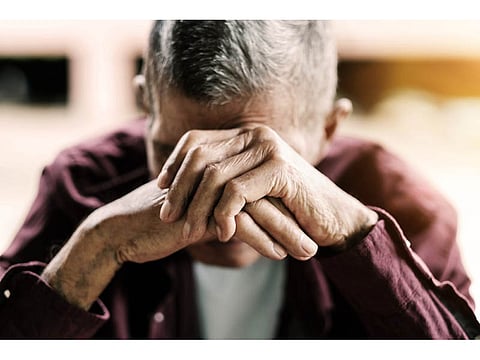As the number of cancer survivors continues to rise in the United States, thanks to population growth, aging and advances in early detection and treatment, it's important to understand the challenges they face during and after cancer therapy.
Chemotherapy, a crucial tool in cancer treatment, can bring some side effects. In this article, experts delve into both short-term and long-term side effects of chemotherapy and explore ways to ease some of these discomforts for improved quality of life.
Chemotherapy side effects
Chemotherapy is a powerful weapon against cancer, targeting fast-growing cancer cells. However, these drugs don't discriminate, according to the American Cancer Society. They can also affect healthy cells that grow rapidly, leading to various side effects. While the prospect of side effects may be worrisome, they're not always as severe as one might imagine.
Here is a list of the most common side effects of chemotherapy:
- Fatigue
- Hair loss
- Easy bruising and bleeding
- Infection
- Low red blood cell counts (anemia)
- Nausea and vomiting
- Appetite changes
- Diarrhea and/or constipation
- Mouth, tongue and throat problems (e.g., sores and pain when swallowing)
- Peripheral neuropathy or other nerve problems (such as numbness, tingling and pain)
- Skin and nail changes (dry skin and color changes)
- Changes in urinary output
- Bladder and kidney problems
- Changes in weight
- "Chemo brain" (affecting concentration and focus)
- Changes in mood
- Changes in sexual function and libido
- Fertility problems
In rare instances, chemotherapy can lead to additional side effects, including:
- Pancreatitis, characterized by inflammation of the pancreas.
- Neutropenic enterocolitis, an inflammation of the intestines that is more likely to occur in individuals with neutropenia.
- Hemolysis, which results in damage to red blood cells.
- Epiphora, or excessive watering of the eyes.
- Acneiform eruptions, which manifest as skin conditions resembling acne.
While some of these uncommon side effects may be minor inconveniences, others can potentially be life-threatening.
Long-term side effects of chemotherapy
Many cancer survivors face the possibility of long-term side effects that can emerge months or even years after their treatment has ended. Recognizing and addressing these late effects is critical to cancer survivorship care.
Common late-term effects of chemotherapy, according to the Mayo Clinic, encompass:
- Dental problems
- Early menopause
- Hearing loss, mild to severe
- Heart problems
- Heightened risk for other cancers
- Infertility
- Loss of taste
- Lung disease
- Nerve damage
- Memory issues
- Osteoporosis
- Problems with digestion
- Reduced lung capacity
In addition to these, other more specific long-term side effects of chemotherapy, as shared by the American Cancer Society, may include heart problems, high blood pressure, lung issues, endocrine system disruptions, menopausal symptoms, bone, joint and soft tissue problems, brain and nerve complications, learning and memory challenges, vision problems, digestion issues, emotional difficulties, secondary cancers and persistent fatigue.
How to minimize chemotherapy side effects
In a video for Cancer.Net, Dr. Jyoti D. Patel, of Northwestern Medical Group, indicates that recent years have witnessed significant strides in the supportive care provided to patients undergoing chemotherapy. Some drugs can maintain white blood cell counts, reducing the risk of life-threatening infections or treatment delays. Some drugs even combat cancer-related weakness.
Nutrition plays a pivotal role, and anti-nausea medications have improved substantially. To tackle the common chemotherapy-induced nausea, the University of California, San Francisco recommends the following:
- Eat slowly
- Opt for small, frequent portions of low-fat, bland and salty foods
- Avoid greasy, fried and heavily spiced foods
- Sip cool, clear beverages between meals
- Rest sitting up for at least an hour after eating
- Keep crackers by your bedside for morning or post-nap nausea
Further, the MD Anderson Cancer Center suggests the following tips to help you through chemotherapy:
- Get ample rest
- Drink plenty of water during your treatment
- Eat when you can to prevent malnutrition
- Stick to your routine as much as you can
- Seek support from family, friends and your care team
- Keep things nearby that bring you joy or comfort
- Stay ahead of the nausea
- Be prepared for hair loss
- Keep a positive attitude
- Remember that experiences with chemotherapy can vary from person to person
References
American Cancer Society: Cancer Treatment and Survivorship Statistics, 2022
American Cancer Society: Chemotherapy Side Effects
American Cancer Society: Long-term Side Effects of Cancer
Mayo Clinic: Cancer Survivors: Late Effects of Cancer Treatment
Cancer.Net (American Society of Clinical Oncology (ASCO)): Managing Side Effects of Chemotherapy, with Jyoti D. Patel, MD
University of California, San Francisco: Diet for Cancer Treatment Side Effects
MD Anderson Cancer Center: 10 Chemotherapy Tips from Cancer Patients Who’ve Been There


